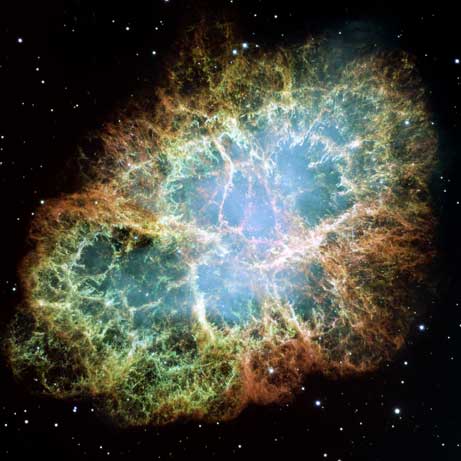
Hubble's View of the Crab Nebula
Zenastronomy
Hubble's View of the Crab Nebula
Zen is a form of Buddhism that is very ancient, and very misunderstood. Because it traditionally involves extreme discipline, it hasn’t widely appealed to the masses who always prefer the quick and easy. Nevertheless, Zen has given everybody an appreciation for the purity of being and non-being, where self and non-self are abolished within a greater understanding. The goal of Zen is liberation from the chain of birth and death, through enlightenment. How does Zen dwell in astronomy?
Astronomy is both science and experience. Both professionals and amateurs use instruments to see what was never seen with human eyes alone. We can use this emerging science to build better theoretical models of the Universe. These new insights help enlighten our oldest questions about Everything and our place in it.
Here is an exquisite Hindu story reproduced in the book, Zen Flesh, Zen Bones, compiled by Paul Reps: There was "a fish who went to a queen fish and asked: ‘I have always heard about the sea, but what is this sea? Where is it?’ The queen fish explained: ‘You live, move, and have your being in the sea. The sea is within you and without you, and you are made of sea, and you will end in sea. The sea surrounds you as your own being.’"
With the availability of so many beautiful Hubble images of nebulae, why do we amateur astronomers tote out our relatively puny instruments to view smudges in gray? Why do we do this repeatedly for the same smudgy objects, even when we are not showing newbies these objects for their first time?
The answer is simple: Each time is our first time.
A Zen saying from Reps’ book urges us to "see as if for the first time a beauteous person or an ordinary object." We are using what Plato calls Beginner’s Mind to stay open to the vastness and suchness of all that is above us, and all that is within us. The Universe is us, and we are the Universe. The most is the least, and the least is the most. Reps book again: "Simply by looking into the blue sky beyond clouds, the serenity." One more: "See all space as if already absorbed in your own head in the brilliance."
Therefore, whenever you see a small group of sky nuts standing out in the darkness of a cold and clear night, reflect on them as if Zen monks in training, bathing in the brilliant beauty of transcendence.